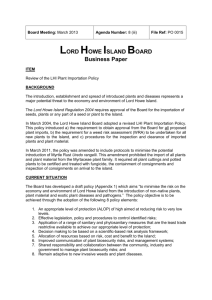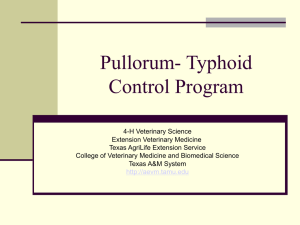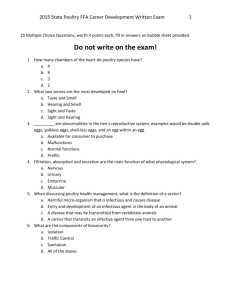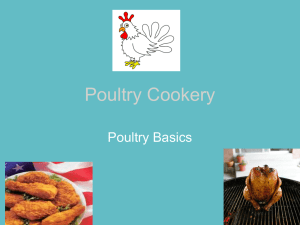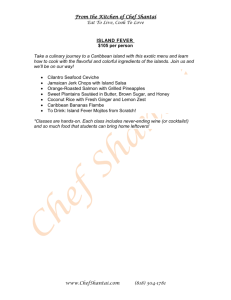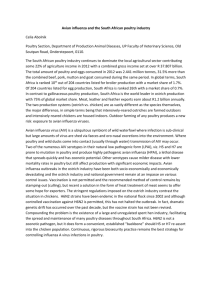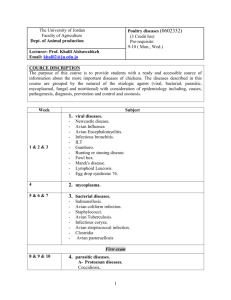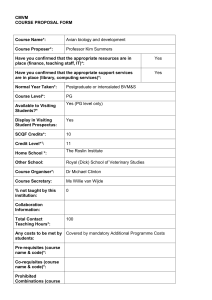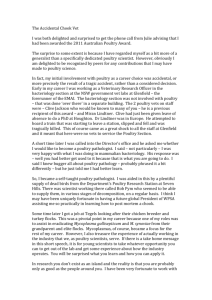Avian Importation Policy
advertisement
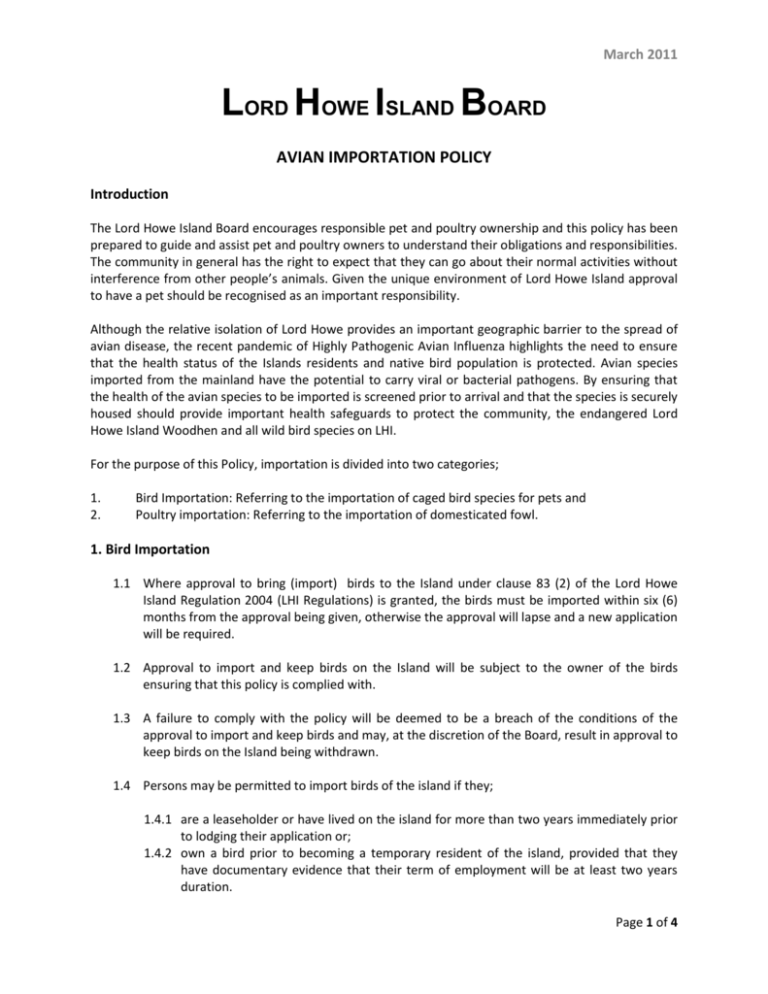
March 2011 LORD HOWE ISLAND BOARD AVIAN IMPORTATION POLICY Introduction The Lord Howe Island Board encourages responsible pet and poultry ownership and this policy has been prepared to guide and assist pet and poultry owners to understand their obligations and responsibilities. The community in general has the right to expect that they can go about their normal activities without interference from other people’s animals. Given the unique environment of Lord Howe Island approval to have a pet should be recognised as an important responsibility. Although the relative isolation of Lord Howe provides an important geographic barrier to the spread of avian disease, the recent pandemic of Highly Pathogenic Avian Influenza highlights the need to ensure that the health status of the Islands residents and native bird population is protected. Avian species imported from the mainland have the potential to carry viral or bacterial pathogens. By ensuring that the health of the avian species to be imported is screened prior to arrival and that the species is securely housed should provide important health safeguards to protect the community, the endangered Lord Howe Island Woodhen and all wild bird species on LHI. For the purpose of this Policy, importation is divided into two categories; 1. 2. Bird Importation: Referring to the importation of caged bird species for pets and Poultry importation: Referring to the importation of domesticated fowl. 1. Bird Importation 1.1 Where approval to bring (import) birds to the Island under clause 83 (2) of the Lord Howe Island Regulation 2004 (LHI Regulations) is granted, the birds must be imported within six (6) months from the approval being given, otherwise the approval will lapse and a new application will be required. 1.2 Approval to import and keep birds on the Island will be subject to the owner of the birds ensuring that this policy is complied with. 1.3 A failure to comply with the policy will be deemed to be a breach of the conditions of the approval to import and keep birds and may, at the discretion of the Board, result in approval to keep birds on the Island being withdrawn. 1.4 Persons may be permitted to import birds of the island if they; 1.4.1 are a leaseholder or have lived on the island for more than two years immediately prior to lodging their application or; 1.4.2 own a bird prior to becoming a temporary resident of the island, provided that they have documentary evidence that their term of employment will be at least two years duration. Page 1 of 4 March 2011 1.5 Applicants must show reasons why they wish to import birds, and provide justification for the breed selected. 1.6 Birds imported to the Island must be kept at the normal place of residence of the approved importer and securely housed. 1.7 Not more than two birds per household shall be permitted, however, applications to import more than two birds will be considered on a case-by-case basis. 1.8 The birds must be of a species approved by the Board (see list below of breeds for which there is an on-going approval). 1.9 Birds imported to the Island must be certified free from disease and parasites (see list below for diseases and parasites). The certification must be proved by the production of a certificate not more than 1 month old, signed by a Veterinary Surgeon registered under the Veterinary Surgeons Act 1986. The certificate must be provided to the Board prior to the bird being imported to the Island. The following breeds of birds have approval for importation: Bird Species Cockatiel (Nymphicus hollandicus) Budgerigar (Melopsittacus undulatus) Canary (Serinus canaries) This policy does not prohibit the re-introduction of ecologically equivalent avian sub species of extinct Lord Howe Island endemic species. The following diseases must be screened before birds are imported to the Island (condition 1.9): Disease Agent Newcastle disease Psittacine Beak and Feather Disease Internal parasites – coccidia, cestodes, nématodes External parasites – lice, mites and ticks 2. Poultry Importation 2.1 Where approval to bring (import) poultry to the Island under clause 83 (2) of the Lord Howe Island Regulation 2004 (LHI Regulations) is granted, the poultry must be imported within six (6) months from the approval being given, otherwise the approval will lapse and a new application will be required. 2.2 Approval to import and keep poultry on the Island will be subject to the owner of the poultry ensuring that this policy is complied with. Page 2 of 4 March 2011 2.3 A failure to comply with the policy will be deemed to be a breach of the conditions of the approval to import and keep poultry and may, at the discretion of the Board, result in approval to keep poultry on the Island being withdrawn. 2.4 Persons may be permitted to import poultry to the island if they; 2.4.1 are a leaseholder or have lived on the island for more than two years immediately prior to lodging their application, or; 2.4.2 provide documentary evidence that their term of employment will be at least two years duration. 2.5 Only day old chicks and fertile eggs purchased from (NSW Department of Primary Industry) certified disease free properties will only be approved for importation to the Island. 2.6 Under clause 87 (a) of the LHI Regulations a person who is granted approval to import poultry to the Island must not keep any poultry that the person owns other than on the land that the person lawfully occupies under the Lord Howe Island Act 1953. 2.7 Where approval is granted to import poultry to the Island the importer, under Section 87 (b) of the Regulation must not permit any such poultry to stray from the land the person lawfully occupies under the Lord Howe Island Act 1953. 2.8 Poultry must be of a species approved by the Board (see list below of breeds for which there is an on-going approval). 2.9 Poultry must be securely penned. Turkeys must be penned at all times with no free-ranging permitted. The following breeds of poultry have approval for importation: Poultry Species Chicken Turkey 3. Transfer of Ownership Applications for the transfer of bird ownership can be made on the same form as an application to import a bird. The person applying must satisfy all relevant conditions of this Policy. 4. Bird and Poultry Control The Board reminds all bird and poultry owners of their responsibility to effectively control their birds and poultry. Non-compliance with the conditions of this policy may render the applicant’s approval invalid and the person ineligible for any future approval. Page 3 of 4 March 2011 5. Seizure of Birds and/or Poultry If a bird and/or poultry are found in contravention of the policy, the bird and/or poultry may be seized. A bird and/or poultry may be seized by officer(s) appointed by the Board, a Police Officer or any other person. If your bird and/or poultry are seized, the Board will notify you as soon as practicable and a release fee may apply. If your bird and/or poultry are seized on a 2nd or subsequent occasion within 12 months of it first being seized the owner of the bird and/or poultry may be fined. 6. Penalties Penalties (enforceable by an on-the-spot fine or in court) may be imposed on the owner of a bird or poultry under Clause 83 and 87 of the Lord Howe Island Regulations 2004 for: Importing a bird and/or poultry without prior approval of the Board. Poultry straying from the land that the person lawfully occupies under the Lord Howe Island Act 1953. It should be noted that these offences are in addition to any seizure options available and consequent release fees etc. For example, a bird and/or poultry found straying can not only be seized, but its owner can also be charged with an offence. Page 4 of 4
